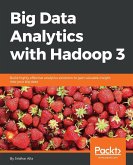Big Data
Herausgeber: Leclerc, Benoit; Cale, Jesse
Big Data
Herausgeber: Leclerc, Benoit; Cale, Jesse
- Gebundenes Buch
- Merkliste
- Auf die Merkliste
- Bewerten Bewerten
- Teilen
- Produkt teilen
- Produkterinnerung
- Produkterinnerung
Big Data entails a major disruption in the ways we think about and do things, which certainly applies to most organisations including those operating in the criminology and criminal justice fields.
Andere Kunden interessierten sich auch für
![Model Induction from Data Model Induction from Data]() DibikeModel Induction from Data75,99 €
DibikeModel Induction from Data75,99 €![Big Data, Political Campaigning and the Law Big Data, Political Campaigning and the Law]() Big Data, Political Campaigning and the Law186,99 €
Big Data, Political Campaigning and the Law186,99 €![Mastering Real-Time Analytics in Big Data A Comprehensive Guide for Everyone Mastering Real-Time Analytics in Big Data A Comprehensive Guide for Everyone]() Lennox MarkMastering Real-Time Analytics in Big Data A Comprehensive Guide for Everyone24,99 €
Lennox MarkMastering Real-Time Analytics in Big Data A Comprehensive Guide for Everyone24,99 €![Effective Big Data Management and Opportunities for Implementation Effective Big Data Management and Opportunities for Implementation]() Effective Big Data Management and Opportunities for Implementation180,99 €
Effective Big Data Management and Opportunities for Implementation180,99 €![BIG DATA MANAGEMENT AND ANALYTICS BIG DATA MANAGEMENT AND ANALYTICS]() Gupta Brij BBIG DATA MANAGEMENT AND ANALYTICS100,99 €
Gupta Brij BBIG DATA MANAGEMENT AND ANALYTICS100,99 €![Big Data Analytics with Hadoop 3 Big Data Analytics with Hadoop 3]() Sridhar AllaBig Data Analytics with Hadoop 344,99 €
Sridhar AllaBig Data Analytics with Hadoop 344,99 €![Big Data Management and Analytics Big Data Management and Analytics]() Rajesh JugulumBig Data Management and Analytics131,99 €
Rajesh JugulumBig Data Management and Analytics131,99 €-
-
-
Big Data entails a major disruption in the ways we think about and do things, which certainly applies to most organisations including those operating in the criminology and criminal justice fields.
Produktdetails
- Produktdetails
- Verlag: Routledge
- Seitenzahl: 150
- Erscheinungstermin: 19. Februar 2020
- Englisch
- Abmessung: 240mm x 161mm x 13mm
- Gewicht: 396g
- ISBN-13: 9781138492783
- ISBN-10: 1138492787
- Artikelnr.: 58768788
- Herstellerkennzeichnung
- Libri GmbH
- Europaallee 1
- 36244 Bad Hersfeld
- gpsr@libri.de
- Verlag: Routledge
- Seitenzahl: 150
- Erscheinungstermin: 19. Februar 2020
- Englisch
- Abmessung: 240mm x 161mm x 13mm
- Gewicht: 396g
- ISBN-13: 9781138492783
- ISBN-10: 1138492787
- Artikelnr.: 58768788
- Herstellerkennzeichnung
- Libri GmbH
- Europaallee 1
- 36244 Bad Hersfeld
- gpsr@libri.de
Benoit Leclerc is an Associate Professor of Criminology and Criminal Justice at Griffith University, Brisbane, Australia. His research interests include the development and application of procedural analysis (ie crime scripting) for purposes of crime investigation, detection and prevention. He is leading several research projects with Corrections and police organisations. With Clifford Shearing and Ross Homel, he is the cofounding editor of Criminology at the Edge, an annual edited volume series in criminology (Routledge). Recent publications appeared in Criminal Justice and Behavior, Crime & Delinquency, the Journal of Research in Crime, and Delinquency and Sexual Abuse. Jesse Cale is an Associate Professor of Criminology in the School of Criminology and Criminal Justice at Griffith University and Adjunct Associate Professor in the School of Social Sciences at the University of New South Wales in Australia. His main areas of research involve the causes and consequences of sexual violence, developmental criminology and criminal justice policy and evaluation. He is a Chief Investigator on several large-scale research grants in Australia funded by the Australian Research Council and different state governments and agencies examining the development of delinquency and criminal offending and the effectiveness of criminal justice policy responses to crime.
1. What Big Data in Criminology and Criminal Justice Through the Lens of
the Business Literature. By Jesse Cale, Benoit Leclerc & Francis Gil
2. The Data Are Everywhere: Integrating Criminology and Epidemiology and
Improving Criminal Justice. By Matt DeLisi
3. Big Data and Criminology from an AI Perspective. By Charlotte Gerritsen
4. Future Applications of Big Data in Environmental Criminology. By
Mohammad Tayebi, Uwe Glässer & Martin A. Andresen
5. Leveraging Police Incident Data for Intelligence-Led Policing. By David
B. Skillicorn, Christian Leuprecht & Alexandra Green
6. The Challenges and Concerns of Using Big Data to Understand Cybercrime.
By Jin Ree Lee & Thomas J. Holt
7. Genetics, Bioethics and Big Data. By Melissa J. Green
8. Big Data: Generic Roadmaps as Global Solutions for Practice. By Benoit
Leclerc & Jesse Cale
the Business Literature. By Jesse Cale, Benoit Leclerc & Francis Gil
2. The Data Are Everywhere: Integrating Criminology and Epidemiology and
Improving Criminal Justice. By Matt DeLisi
3. Big Data and Criminology from an AI Perspective. By Charlotte Gerritsen
4. Future Applications of Big Data in Environmental Criminology. By
Mohammad Tayebi, Uwe Glässer & Martin A. Andresen
5. Leveraging Police Incident Data for Intelligence-Led Policing. By David
B. Skillicorn, Christian Leuprecht & Alexandra Green
6. The Challenges and Concerns of Using Big Data to Understand Cybercrime.
By Jin Ree Lee & Thomas J. Holt
7. Genetics, Bioethics and Big Data. By Melissa J. Green
8. Big Data: Generic Roadmaps as Global Solutions for Practice. By Benoit
Leclerc & Jesse Cale
1. What Big Data in Criminology and Criminal Justice Through the Lens of
the Business Literature. By Jesse Cale, Benoit Leclerc & Francis Gil
2. The Data Are Everywhere: Integrating Criminology and Epidemiology and
Improving Criminal Justice. By Matt DeLisi
3. Big Data and Criminology from an AI Perspective. By Charlotte Gerritsen
4. Future Applications of Big Data in Environmental Criminology. By
Mohammad Tayebi, Uwe Glässer & Martin A. Andresen
5. Leveraging Police Incident Data for Intelligence-Led Policing. By David
B. Skillicorn, Christian Leuprecht & Alexandra Green
6. The Challenges and Concerns of Using Big Data to Understand Cybercrime.
By Jin Ree Lee & Thomas J. Holt
7. Genetics, Bioethics and Big Data. By Melissa J. Green
8. Big Data: Generic Roadmaps as Global Solutions for Practice. By Benoit
Leclerc & Jesse Cale
the Business Literature. By Jesse Cale, Benoit Leclerc & Francis Gil
2. The Data Are Everywhere: Integrating Criminology and Epidemiology and
Improving Criminal Justice. By Matt DeLisi
3. Big Data and Criminology from an AI Perspective. By Charlotte Gerritsen
4. Future Applications of Big Data in Environmental Criminology. By
Mohammad Tayebi, Uwe Glässer & Martin A. Andresen
5. Leveraging Police Incident Data for Intelligence-Led Policing. By David
B. Skillicorn, Christian Leuprecht & Alexandra Green
6. The Challenges and Concerns of Using Big Data to Understand Cybercrime.
By Jin Ree Lee & Thomas J. Holt
7. Genetics, Bioethics and Big Data. By Melissa J. Green
8. Big Data: Generic Roadmaps as Global Solutions for Practice. By Benoit
Leclerc & Jesse Cale









